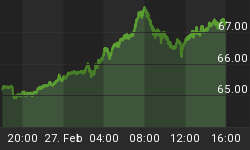Talk about an early Halloween! It's mid-month and already we have a scary composite of the financial picture. Sub-par employment data, rising oil prices, suicide attacks, and election concerns top the list of investor worries. And that's only the tip of the iceberg if you listen to the mainstream press!
So here we are three weeks ahead of the U.S. presidential election and already the market has a lot of worries to chew on. But guess what? The market LOVES worry, especially when it comes from the "herd" (as represented in the popular press). So with that in mind let's take a closer look at some of the driving influences behind the financial markets and economy in the months to come.
Three months ago I warned of an imminent "micro-mini recession" that would be most strongly felt in the summer months up until the bottoming of the 10-year cycle in October. At the time I observed, "The...huge downturn in M3 money supply last year (on a rate of change basis) is being felt strongly and is the main cause of the erosion seen in recent economic numbers." I added that the 10-year cycle was also behind this minor economic slowdown and surmised that the Fed was at least in part behind the 10-year cycle itself (another subject altogether!)
I'm happy to report that the micro-mini recession is in the process of ending. Underneath the surface, undetected by the mainstream press, are signs that the micro-mini recession is about over and a new period of economic improvement is on the verge of beginning. Just last week the Federal Reserve data showed a sizeable increase in the M2 money supply figure (see chart below). As stock market analyst Don Hayes recently commented, "This is not 'Greenspan Talk' but instead is 'Greenspan Walk,'" and is much more important than the interest rate and fed funds rate jargon we're bombarded with on a daily basis. See for yourself -- as Peter Duray-Bito of bullandbearwise.com says, "A chart is worth a thousand words of high fallutin' economic mumbo-jumbo."

Granted, it will most likely take a few more months before behind-the-curve mainstream economists register this turnaround in their economic data. The improvement won't start to show up in traditional economic measures until well into 2005. But I'm telling you now, the minor recession we've experienced in recent months is coming to an end!
What about the presidential election coming up in November? Isn't the market reflecting uncertainty over the less-than-certain election outcome? Would the market perform better under John Kerry or George Bush? Which candidate is better for the economy? Answer: The market doesn't care who wins the election, nor has it ever cared! The course of the economy and markets, especially within a 4-year "business cycle," is determined in advance by the actions of the Fed, not presidential policy.
Richard Maybury, in his excellent U.S. & World Early Warning Report (P.O. Box 84908, Phoenix, AZ 85071), makes this observation concerning elections: "As for our ballots, the powers-that-be do not care who we vote for, as long as it is a democrat or republican. Both major parties stand for more bureaucracy, more power, more meddling in our lives, and in the lives of foreigners."
In fact, a president's domestic policy doesn't usually take full effect until AFTER his first 4-year term expires. Let's assume the worst-case scenario (from Wall Street's standpoint): Should Kerry win, even if his policies are detrimental to the economy in the long-run, we won't even feel those ill effects until 2008 or thereafter. So it really doesn't matter if he wins as far as the 2005-2008 outlook is concerned.
Another good point made by Maybury is that the economy isn't in nearly as bad a shape as many commentators seem to believe. He observes, "This is not paradise, but it isn't the Great Depression either. What it is, is normal." He adds, "Why do so many believe we are in an economic crisis? One reason is that the mainstream press was hoodwinked about the war, so they are getting their revenge, doing all they can to make Bush look bad. A second reason is that the big boom of the 1990s lasted so long and was so intense that for millions, normality feels like a recession."
I believe we can add as the primary reason why so many believe the economy is worse than it is in reality is simply a function of the 10-year cycle. In fact every 10-year cycle bottom year produces this type of negativism on the economic outlook. But these bearish feelings will all be but a memory next year.
The Fed has made it clear through their policy that they intend to pull every rabbit out of the hat to keep the economy on an even keel in the foreseeable future. The bottoming of the 10-year cycle coupled with the upswing in money supply will most likely produce a vibrant outlook for the year ahead, despite the consensus thinking that the year after an election is usually recessionary. This rule doesn't apply when presidential elections coincide with 10-year cycle bottoms, as was the case in 1985 after the '84 election. This will also likely be the case for 2005.















